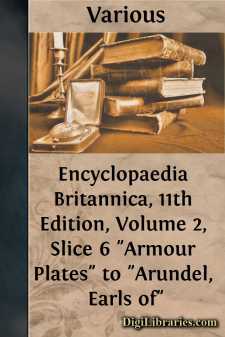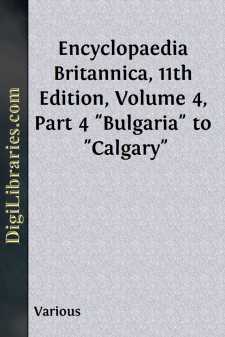Reference
- Atlases 1
- Bibliographies & Indexes 10
- Catalogs 55
- Dictionaries 1
- Encyclopedias
- Etiquette 14
- Handbooks & Manuals 19
- Heraldry 2
- Quotations 9
Encyclopedias Books
Sort by:
by:
Various
ARMOUR PLATES. The earliest recorded proposal to employ armour for ships of war (for body armour, &c., see ) appears to have been made in England by Sir William Congreve in 1805. InThe Timesof the 20thDefence for ships.of February of that year reference is made to Congreve’s designs for an armoured, floating mortar battery which the inventor considered would be proof against artillery fire. Among...
more...
by:
Various
INITIALS USED IN VOLUME VII. TO IDENTIFY INDIVIDUALCONTRIBUTORS, WITH THE HEADINGS OF THEARTICLES IN THIS VOLUME SO SIGNED.A. B. F. Y.Alexander Bell Filson Young.Formerly Editor of theOutlook. Author ofChristopher Columbus;Master-singers;The Complete Motorist;Wagner Stories; &c.{Dance(in part).A. Bo.*Auguste Boudinhon, D.D., D.C.L.Professor of Canon Law in the Catholic University of Paris. Honorary...
more...
by:
Various
CELTES, KONRAD (1459-1508), German humanist and Latin poet, the son of a vintner named Pickel (of which Celtes is the Greek translation), was born at Wipfeld near Schweinfurt. He early ran away from home to avoid being set to his father’s trade, and at Heidelberg was lucky enough to find a generous patron in Johann von Dalberg and a teacher in Agricola. After the death of the latter (1485) Celtes led...
more...
by:
Various
(Lat. _conventio_, an assembly or agreement, from _convenire_, to come together), a meeting or assembly; an agreement between parties; a general agreement on which is based some custom, institution, rule of behaviour or taste, or canon of art; hence extended to the abuse of such an agreement, whereby the rules based upon it become lifeless and artificial. The word is of some interest historically and...
more...
by:
Various
BEDLAM, or Bethlehem Hospital, the first English lunatic asylum, originally founded by Simon FitzMary, sheriff of London, in 1247, as a priory for the sisters and brethren of the order of the Star of Bethlehem. It had as one of its special objects the housing and entertainment of the bishop and canons of St Mary of Bethlehem, the mother-church, on their visits to England. Its first site was in...
more...
by:
Various
DODWELL, EDWARD (1767-1832), English traveller and writer on archaeology. He belonged to the same family as Henry Dodwell the theologian, and was educated at Trinity College, Cambridge. He travelled from 1801 to 1806 in Greece, and spent the rest of his life for the most part in Italy, at Naples and Rome. He died at Rome on the 13th of May 1832, from the effects of an illness contracted in 1830 during...
more...
by:
Various
EDWARDES, SIR HERBERT BENJAMIN (1819-1868), English soldier-statesman in India, was born at Frodesley in Shropshire on the 12th of November 1819. His father was Benjamin Edwardes, rector of Frodesley, and his grandfather Sir John Edwardes, baronet, eighth holder of a title conferred on one of his ancestors by Charles I. in 1644. He was educated at a private school and at King’s College, London....
more...
by:
Various
CAMORRA, a secret society of Naples associated with robbery, blackmail and murder. The origin of the name is doubtful. Probably both the word and the association were introduced into Naples by Spaniards. There is a Spanish word camorra (a quarrel), and similar societies seem to have existed in Spain long before the appearance of the Camorra in Naples. It was in 1820 that the society first became...
more...
by:
Various
ARAM, EUGENE(1704-1759), English scholar, but more famous as the murderer celebrated by Hood in his ballad, theDream of Eugene Aram, and by Bulwer Lytton in his romance ofEugene Aram, was born of humble parents at Ramsgill, Yorkshire, in 1704. He received little education at school, but manifested an intense desire for learning. While still young, he married and settled as a schoolmaster at Netherdale,...
more...
by:
Various
BULGARIA (continued from part 3) ... the mean interval being 60 m.; the summits are, as a rule, rounded, and the slopes gentle. The culminating points are in the centre of the range: Yumrukchál (7835 ft.), Maragudúk (7808 ft.), and KadimlÃa (7464 ft.). The Balkans are known to the people of the country as the Stara Planina or "Old Mountain," the adjective denoting their greater size as...
more...











